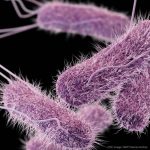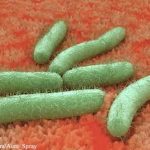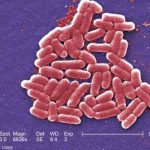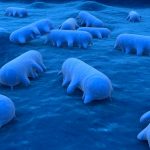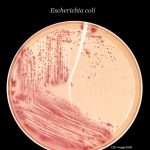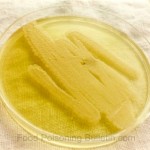A study published in PLOS Pathogens has discovered that Salmonella bacteria relies heavily on a single nutrient called frustose-asparagine (F-Asn) when it grows in the intestine. This nutrient is crucial to Salmonella growth in the inflamed intestine. When it doesn't have access to this specific nutrient, the bacteria is significantly weakened. Since there are so many nutrients available to that bacterium in the intestine, doctors have thought that targeting those nutrients with drugs to stop the bacterial growth is next to impossible. But stopping access to a single nutrient is another story. Researchers found that a mutant of Salmonella that cannot get fructose-asparagine is "severely attenuated, suggesting that F-Asn is the primary nutrient utilized by Salmonella during … [Read more...]
Scientists Discover Achilles’ Heel in Antibiotic Resistant Bacteria
Scientists at the University of East Anglia may have discovered the Achilles' heel of antibiotic resistant bacteria. The research, published in the journal Nature, has found a defensive barrier that drug-resistant bacteria form around themselves. The gram negative bacteria, which include E. coli, form an impermeable lipid-based outer membrane that protects the organisms against attacks by the human immune system and antibiotics. Removing this barrier lets antibiotics kill the bacteria. The study found how the cells transport the barrier's building blocks, lipopolysaccharides, to the surface of the bacteria. Group leader Professor Changjiang Dong said in a statement, "we have identified the path and gate used by the bacteria to transport the barrier building blocks to the outer … [Read more...]
Researchers at KSU Created Better E. coli Detection Methods
Researchers at Kansas State University are creating better ways to detect E. coli to improve the cattle industry and protect consumers. Lane Noll, master's student in veterinary biomedical science, Dr. T.G. Nagaraja, and Jianfa Bai are leading the project. A USDA Coordinated Agriculture Project grant is funding the research. Noll has developed a molecular assay that can "detect and quantify major genes specific for E. coli O157. He said in a statement, "developing a method to detect E. coli before it can potentially contaminate the food supply benefits the beef industry by preventing costly recalls but also benefits the consumer by ensuring the safety of the beef supply." The test finds the bacteria through "fingerprints", or genetic sequences, that are unique to that organism. The … [Read more...]
Study Discovers How Salmonella May Evade Immune System
A new study conducted at the University of Pennsylvania, and published in the Journal of Experimental Medicine may have discovered how Salmonella bacteria dodge the immune system. This lets them multiply and build up a presence that causes a systemic, or blood, infection. Normally, the immune system recognizes pathogens and releases molecules to kill them. Inflammasomes are a protein complex in animals that finds pathogens and tells the immune system to fight the invaders. The scientists discovered that Salmonella avoids inflammasome activation by "down-regulating flagellin expression". The study's lead author, assistant professor of pathobiology at the School of Veterinary Medicine Dr. Igor Brodsky, said, "we hypothesized that during the systemic phase of disease, Salmonella would have … [Read more...]
Cow Manure Has New Antibiotic Resistance Genes
A new study funded by the Swiss National Science Foundation and the U.S. National Institutes of Health found that cow manure harbors diverse new antibiotic resistance genes. This material is commonly used as a farm fertilizer. It's worth noting that produce is one of the main sources of food poisoning in the United States; fertilizer, along with runoff from farms are two of the ways leafy greens and other fruits and vegetables can become contaminated. The study, published in American Society for Microbiology journal, tried to find which antibiotic resistant genes are in cow manure. The scientists used a "screening-plus sequencing" approach and found 80 unique and functional antibiotic resistant genes. Those genes made E. coli bacteria resistant to antibiotics. Researchers found an … [Read more...]
Research Shows How E. coli O157:H7 Binds to Produce
New research presented at the Society for General Microbiology's Annual Meeting showed how E. coli O157:H7 binds with plant cells. This lets the bacterium hold on to the plant's surface so it can multiply. And that means that washing produce is not going to easily remove this pathogenic bacteria. Between 20 to 30% of food poisoning outbreaks are linked to contaminated vegetables. Researchers from the James Hutton Institute in Scotland found that E. coli O157:H7 uses flagella, which are thin appendages usually used for movement, to penetrate the plant cell walls. The flagella interacts with fat molecules in the plant cell membranes. Once they are attached, the E. coli bacteria colonize the plant's surface. Most of the bacteria can be removed by washing at this point, but some can … [Read more...]
Research at Texas A&M Studies E. coli on Leafy Vegetables
Research at Texas A&M is looking at E. coli contamination on leafy vegetables. The research looks at how the likelihood that a crop will be contaminated by E. coli before harvest is strongly influenced by both farm management and environmental factors. The study is published in the journal Applied and Environmental Microbiology. Contaminated produce is the most common source of food poisoning in this country. Between 1998 and 2008, of the 68,000 food poisoning illnesses that were assigned to one of the 17 food commodities, 13% were associated with leafy greens. And the number of illnesses caused by leafy greens is increasing, from 6% in 1999 to 11 percent in 2008. The study, led by Dr. Renata Ivanek, cross-referenced environmental data with information from farms in several … [Read more...]
Radio Waves Kill Salmonella Bacteria in Raw Eggs
A study published in Agricultural Research magazine has found that radio waves can kill Salmonella bacteria in raw eggs without affecting taste or texture. Since one of every 20,000 eggs produced in the U.S. has a high risk of being contaminated with the Salmonella bacteria, and since many people eat raw or undercooked eggs, this is an important finding. At least 3,750,000 contaminated eggs are sold every year in this country. Salmonella bacteria are killed by heat. Pasteurized eggs are safer, but they can be difficult to use, especially since the egg whites do not whip to the same volume as untreated eggs. Pasteurized eggs are immersed in hot water and held at a minimum temperature for about an hour to kill the pathogenic bacteria. In the study, scientists tested 4,000 fresh shell … [Read more...]
U.S. Army Developing Handheld Food Safety Tool
The U.S. Army is developing a handheld inspection tool to increase food safety for soldiers. The Natick Soldier Research, Development, and Engineering Center is making a small, sensitive, hand-held device that will "both capture and detect dangerous pathogens that can cause food-related illness." Scientists at the Natick Center are collaborating with the FDA, Winchester Engineering and Analytical Center, and the Massachusetts Institute of Technology after receiving a 2013 FDA leveraging and collaboration award. The award is for "Designing Handheld Resistance Based Biosensors Utilizing Conducting Nonwoven Fibers for In-Field Microbial Pathogen Detection." Since food safety is critical to combat readiness, this tool will reduce the danger faced by troops. Andre Senecal, one of the … [Read more...]
Study Finds Diet Alters Human Gut Microbiome
Bacteria in our guts play an important role in health. An imbalance in gut bacteria can be linked to everything from inflammatory bowel disease to reduced immunity, changes in behavior, and weight problems. A new study published in Nature finds that diet can rapidly alter our gut microbiome. An animal-based diet increases the abundance of bile-tolerant microorganisms and decreases the levels of bacteria that metabolize plant polysaccharides. A plant-based diet Foodborne microbes from both meat and plant-based diets colonize the gut. These microbes can include bacteria, fungi, and viruses. The animal-based diet let bacterium linked to inflammation and intestinal diseases flourish. While long-term dietary changes influence the gut microbiome, scientists did not think that the … [Read more...]
